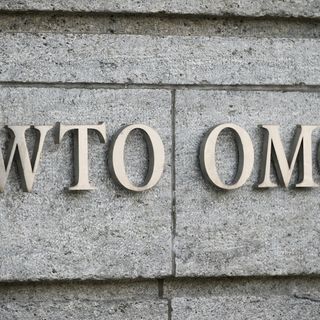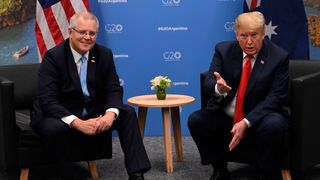The meeting between the US and Chinese presidents stole the headlines coming out of the G20 leaders’ meeting in Buenos Aires. Almost unreported was the failure of the Brisbane Action Plan that was developed during Australia’s G20 host year in 2014.
The plan, intended to grow the world economy by 2.1 per cent by 2018 relative to an October 2013 baseline, has reportedly been shelved despite the efforts of Australian officials to keep it on the G20’s agenda.
Australia’s inclusion in the G20 grouping has often been hailed as a victory for Australian diplomacy and Australian politicians and policymakers have attached a great deal of importance to the forum, believing it gives Australia and other middle powers a greater voice on international issues.
World Trade Organization will be put to the test in 2019

The Brisbane Action Plan is not the first G20 commitment to be honoured more in the breach than in the observance.
The 2008 standstill on protection was widely hailed as preventing a protectionist response to the global financial crisis. But according the Global Trade Alert database, the G20’s members have introduced new interventions that discriminate against foreign commercial interests every 10 hours since 2008.
For its part, Australia has logged more than 300 such discriminatory interventions.
The latest GTA report calls G20 compliance with its pledge on protection “a polite fiction”.
Similarly, the 2010 Toronto summit endorsed fiscal consolidation objectives that were abandoned by the time of the St Petersburg summit in 2013, when they were meant to have been achieved.
While the G20 is often given credit for marshalling the fiscal response to the global financial crisis, the sharp disagreements between the United States and Europeans over what constituted fiscal stimulus only served to undermine the international political legitimacy of these efforts.
The G20 has rarely lived up to expectations because it is a fundamentally flawed forum for global governance.
The G20 has rarely lived up to expectations because it is a fundamentally flawed forum for global governance.
The initial membership was an arbitrary selection drawn at the initiative of the United States, Germany and Canada in 1999 in the aftermath of the emerging markets crisis of 1997-98.
The elevation of the ministerial process to the status of a leader’s meeting during the 2008-09 financial crisis was an admission that the narrower G7/8 leaders’ process was flawed.
But the G20’s cobbled together origins in these crises meant that many of the long-standing issues around the representativeness and effectiveness of the G7/8 were not addressed.
The expansion in membership addressed the issues of inclusiveness and legitimacy that were seen as undermining the effectiveness of the G7/8, but multiplied the problems of a lack of membership criteria, common interests or values.
The G20 leaders’ process was premised on the idea that the financial crisis was the result of a lack of international coordination on economic policy, but there is little evidence for this proposition.
Economies with floating exchange rates, open capital accounts and independent central banks do not need to coordinate their economic policies. Financial markets largely perform that function, not least in crisis situations, when exchange rates and interest rates adjust far more quickly than politicians can make and implement decisions.
The former Bretton Woods system of fixed exchange rate required the coordination of macroeconomic policies, but proved insufficiently flexible or robust to the shocks that routinely hit the global economy.
An earlier G20 proposal to cap current account imbalances at 4 per cent of member economies only served to raise tensions between G20 governments and would have constrained economic growth in capital-importing countries like Australia.
Defending Australia's open door: Don't blame globalisation for populism

The great strength of Australia’s Brisbane Action Plan was in recognising that the G20 was not more than the sum of its parts.
The Australian government sought to focus the G20 on structural domestic economic policies that would raise economic growth in member economies and so grow the world economy.
But domestic economic policies do not require international coordination, they need domestic political leadership.
Most countries seek to maximise their economic growth rate subject to domestic policy constraints the G20 process does little to alleviate.
Australia’s own contribution to the Action Plan gave the game away. It was an inventory of existing policy commitments that owed little to the G20 process.
The effort the Abbott government put into Australia’s G20 host year distracted Treasurer Hockey from the task of leading domestic economic reform, so that even Australia failed to deliver on its Action Plan.
The distraction of hosting the G20 has been cited by several leading political commentators as a factor in the demise of Tony Abbott’s government. Australia is still dealing with the political consequences.
The lesson for future Australian governments is not to over-invest scarce political and diplomatic resources into a flawed forum for global governance.




